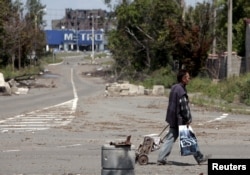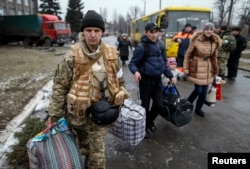With the conflict in Ukraine now in its fourth year casualties have mounted substantially in recent months, according to a new report by the Office of the United Nations High Commissioner for Human Rights.
Between mid-February and mid-May of this year, the period covered, U.N. investigators documented 193 conflict-related civilian casualties, including 36 deaths.
“This is a 48 percent increase over the last reporting period,” said High Commissioner Zeid Ra'ad al-Hussein in presenting an oral update on the human rights situation. Speaking to the U.N. Human Rights Council Wednesday, Zeid also said, “The majority of these casualties resulted from shelling, explosive devices and remnants of war.”
He noted that so far this year, there were 375 conflict-related civilian casualties, including 67 deaths and 308 injuries - a 74 percent increase compared to the same period last year.
“The number of civilian casualties caused by shelling has doubled,” he said. “These statistics speak to the changing nature of conflict: it is intensifying, with both sides very close to each other and heavy weapons, soldiers and members of armed groups frequently embedded in civilian areas or alongside civilian infrastructure.”
10,000 dead
Since April 2014 when war erupted in eastern Ukraine between the government and Russian-backed separatists, the United Nations estimates around 10,000 people have been killed and more than 23,500 injured.
Serhiy Kyslytsya, Ukraine’s deputy minister for foreign affairs, concurred with the high commissioner’s assessment and the findings of the report, which noted "continuous inflow of foreign fighters and supply of ammunition and heavy weaponry from the Russian Federation into parts of Donetsk and Luhansk regions of Ukraine.”
The minister added that while this Russian practice continues, there is “no end to the conflict in sight.”
The warring parties' first effort to try to halt the war resulted in the so-called Minsk protocol signed in September 2014 by Ukraine, rebel forces in eastern Ukraine, Russia and the Organization for Security and Cooperation in Europe (OSCE). This agreement and subsequent efforts to end the crisis have ended in failure.
“Key commitments made under the Minsk agreements continue to be largely ignored,” said Zeid.
“Daily violations of the cease-fire, routine use of heavy weapons in breach of the withdrawal lines, and indiscriminate shelling have continued to take a heavy toll on civilian lives and property.
“The associated trend of increased cease-fire violations suggests there is no political will to stop the fighting,” he said.
The U.N. reports hospitals and schools in eastern Ukraine have been damaged by shelling. It said the Donetsk Filtration Station and the South Donbas first pumping station also were repeatedly damaged due to shelling, “endangering safe water supply to more than one million people on both sides of the contact line.”
750,000 children under threat
Earlier this week, the U.N. Children’s Fund warned of serious repercussions for some 750,000 children cut off from safe drinking water.
“Why we are worried is because the children who are cut off from clean drinking water can quickly contract water-borne disease, such as diarrhea,” said Christophe Boulierac, UNICEF spokesman.
“Girls and boys having to fetch water from alternative sources or who are forced to leave their homes due to disruptions to safe water supplies face dangers from ongoing fighting and other forms of abuses,” he said.
Zeid found that both sides of this war were to blame for human rights violations. He noted that his staff has documented cases of unlawful and arbitrary detention on both sides of the contact line, “coupled with abuse amounting to torture or ill-treatment.”
He said that “allegations indicate almost systematic use of torture and ill-treatment by the Security Service of Ukraine against conflict-related detainees for purposes of extracting confessions.
“This is compounded by ineffective investigations of complaints by victims,” he said.
Crimea rights violations
The high commissioner lambasted the human rights situation in Crimea, which Russia annexed in March of 2014.
Zeid said the report documents “worrisome cases of disregard of fair trial guarantees, notably in court decisions against Crimean Tatars.
“Several cases of grave ill-treatment of persons in detention were also documented, as well as the transfer of persons from Crimea to detention facilities in the Russian Federation.”
He said this was done in violation of the Fourth Geneva Convention.
The unlawful annexation of the Crimean Peninsula prompted the United States and European Union to impose sanctions on Russian individuals and businesses. In a meeting with Ukrainian President Petro Poroshenko Tuesday, U.S. President Donald Trump assured him that Washington would continue its sanctions on Russia.
In response to the report, Russia voiced concerns about new cases of arbitrary and illegal detention, and the use of torture by Ukrainian security forces “to obtain confessions in the Donbas region.”
Natalia Zolotova, first secretary of the Russian mission, said her country “deplored the lack of investigation on the crimes committed by Ukrainian authorities.”
She stressed that Kyiv was responsible for “inhuman acts of discrimination” by imposing a blockade on the Donbas region.
Ukrainian Deputy Foreign Minister Kyslytsya said the only way that human rights in the Donbas region and Crimea will improve is “through full consolidation of the international community and its constant political pressure on occupying state – the Russian Federation.”






